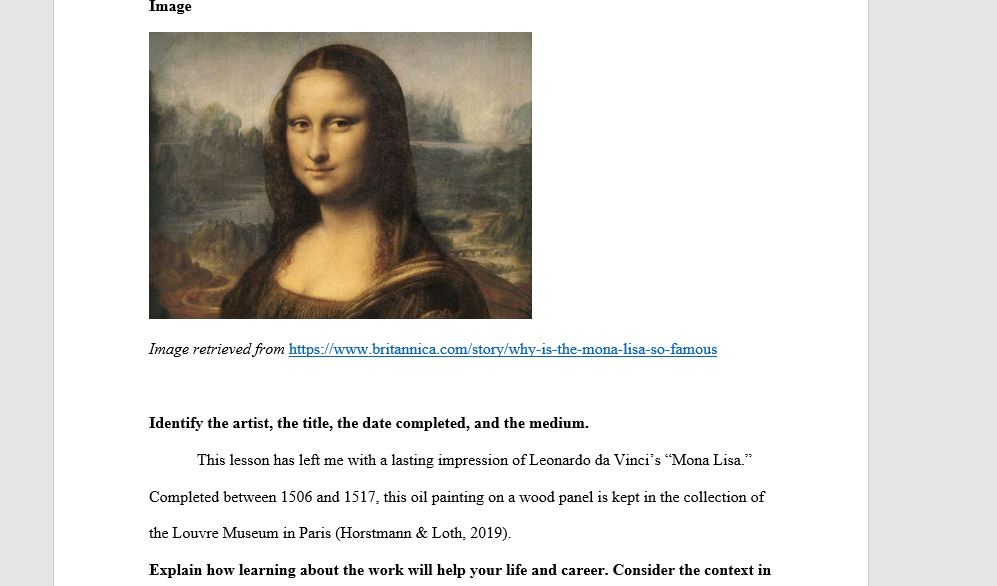Humanity and Philosophy
For this assignment, choose a work of art that made an impression on you during this course. Then, address the following:
Include an image of or link to the work.
Identify the artist, the title, date completed, and the medium.
Explain how learning about the work will help you in your life and career. Consider the context in which the work was created and the meaning of the work.
Explain how one or more specific disciplines (literature, drama, philosophy, art, music) influenced you.
Examine the effect that you think this class could have on your career and personal life.
For the initial post, select and address one of the following options:
Option 1: Choose a work to discuss from one genre that interprets a work from another genre.
Include the title, artist, and description of both works.
Examine how the artist of the second work captured the subject or story of the first.
Support your point(s) with a statement from the second artist that discusses the influence, reasoning, or interpretation of the original work on the second work.
Option 2: Choose a work that is interdisciplinary (incorporates two or more disciplines), such as Hamilton from our lesson this week.
Include the title and artist(s).
Examine the genres that are intermingled to create the work.
How effective is the blending of genres in the work?
Why do you think the artist used different disciplines in the work?
Support your point(s) with a statement from the artist and one from a critic.
Option 3: Choose a work of art from any genre that depicts or tells the story of a real life event from any time period, such as The Consecration of the Emperor Napoleon and the Coronation of Empress Joséphine on December 2, 1804 by Jacques Louis David.
Include the title and the artist and some background of the event.
What is the relationship between the work of art and the event?
Did the artist depict the event accurately?
Does the artist make changes regarding the event? If so, why do you think the artist made these changes?
Examine the artist’s message in the depiction.
Support your point(s) with a statement from the artist.
For the initial post, pick one point of view from the five questions above that you find particularly repugnant – one that you think is completely unjustifiable. If you were in conversation with such a person, how could you ethically respond to the statement of such a point of view? Keep in mind that you are expressing a value opinion, which requires ideological reasoning, so you may want to review Chapter 13.
As you form your response, keep in mind the following; these are things you need to think about but not necessarily to write about in your initial post:
Reflect if you are using System-1 or System-2 thinking? Are your responses tinged with cognitive bias?
Do you think there is a qualitative difference between believing some races are inferior and the belief that marriage should only be between one man and one woman?
Do you think there is a qualitative difference between not believing in human contribution to climate change and not believing in the Holocaust?
Introduction
Remember – these journal questions require more thinking than writing. Think about exactly what you are asked to do, and then write as economically as possible.
Instructions
Critical Thinking
o Go back to your very first journal entry – review your definition of critical thinking. After studying critical thinking for the past eight weeks, would you change your definition in any way? If yes, how and why? If no – if it was perfect – what parts of the text were best reflected in your definition?
Heart of the Matter
o Recall in your first journal entry that you discussed the authors’ statement that the concepts in Chapters 12, 13 and 14 were “the heart of
the matter.” After having studied those chapters, answer again, with renewed understanding, the question posed there: Why do you think the
authors find these concepts important to critical thinking?
Ethical Decision-Making
o The lecture claims that an argument is no good unless it has a “strong and reasoned ethical base.” Do you agree that ethics is an essential element of a good argument? If yes, why? If no, why not?
Looking Forward
o Do you believe that you now know everything you need to know about critical thinking – or is learning to think critically a life-long task? Explain your answer.
Answer preview for Humanity and Philosophy

APA
1522 Words
